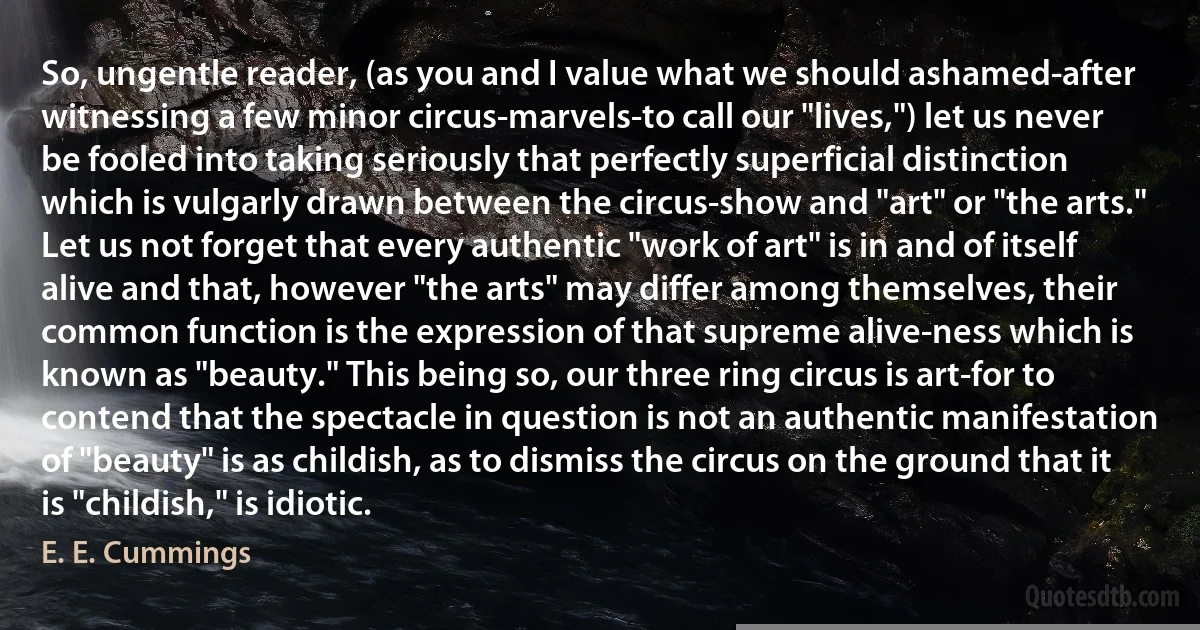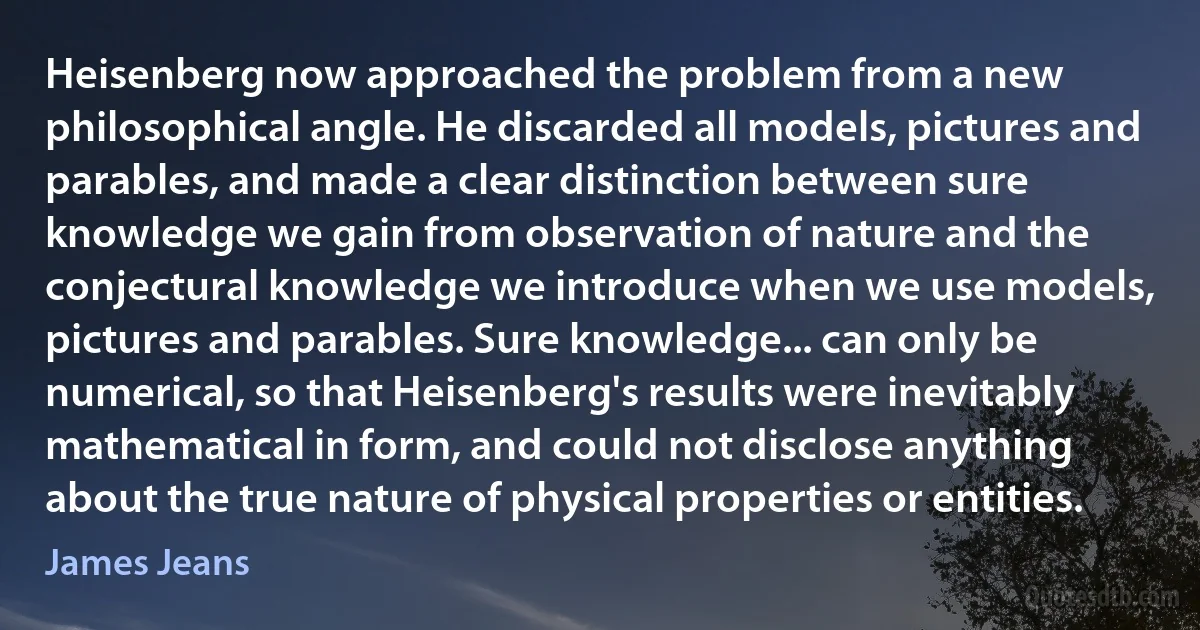Distinction Quotes - page 10
Tell a dream, lose a reader, said Henry James. Joyce told a dream, Finnegans Wake, and he told it in puns - cornily but rightly regarded as the lowest form of wit. This showed fantastic courage, and fantastic introversion. The truth is Joyce didn't love the reader, as you need to do. Well, he gave us Ulysses, incontestably the central modernist masterpiece; it is impossible to conceive of any future novel that might give the form such a violent evolutionary lurch. You can't help wondering, though. Joyce could have been the most popular boy in school, the funniest, the cleverest, the kindest. He ended with a more ambiguous distinction: he became the teacher's pet.

Martin Amis
According to Aristotle then excellence of character and intelligence cannot be separated. Here Aristotle expresses a view characteristically at odds with that dominant in the modern world. The modern view is expressed at one level in such banalities as ‘Be good, sweet maid, and let who will be clever' and at another in such profundities as Kant's distinction between the good will, the possession of which alone is both necessary and sufficient for moral worth, and what he took to be a quite distinct natural gift, that of knowing how to apply general rules to particular cases, a gift the lack of which is called stupidity. So for Kant one can be both good and stupid; but for Aristotle stupidity of a certain kind precludes goodness.

Alasdair MacIntyre
The powers of the legislature are defined, and limited; and that those limits may not be mistaken, or forgotten, the constitution is written. To what purpose are powers limited, and to what purpose is that limitation committed to writing, if these limits may, at any time, be passed by those intended to be restrained? The distinction, between a government with limited and unlimited powers, is abolished, if those limits do not confine the persons on whom they are imposed, and if acts prohibited and acts allowed, are of equal obligation. It is a proposition too plain to be contested, that the constitution controls any legislative act repugnant to it; or, that the legislature may alter the constitution by an ordinary act.

John Marshall
For the image possesses qualities which, under certain circumstances, can make it much more interesting than the object which inspired it. The portrait of a commonplace person can astound us with an air of distinction, reminding us that the best portrait is that which resembles the painter, not the model.

Jean Metzinger
Now as for thinking your account a tale or story, my dear Franz, to be a good story is to me the highest the highest test of the truth of anything. I make no distinction whatever between reality and fantasy, or the objective and the subjective. All life and all awareness are ultimately one, including intensest pain and death itself. Not all the play need please us, and ends are never comforting. Some things fit together harmoniously and beautifully and startlingly with thrilling discords-those are true-and some do not, and those are merely bad art.

Fritz Leiber
Then the theory of relativity came and explained the cause of the failure. Electric action requires time to travel from one point of space to another, the simplest instance of this being the finite speed of travel of light... Thus electromagnetic action may be said to travel through space and time jointly. But by filling space and space alone [excluding time] with an ether, the pictorial representations had all supposed a clear-cut distinction between space and time.

James Jeans
As we live by the Muses, it is but a Gratitude in us to encourage Poetical Merit wherever we find it. The Muses, contrary to all other Ladies, pay no Distinction to Dress, and never partially mistake the Pertness of Embroidery for Wit, nor the Modesty of Want for Dulness. Be the Author who he will, we push his Play as far as it will go. So (though you are in Want) I wish you success heartily.

John Gay
So far as it goes, the distinction, between an atrocity and an act of war is valid. An atrocity means an act of terrorism which has no genuine military purpose. One must accept such distinctions if one accepts war at all, which in practice everyone does. Nevertheless, a world in which it is wrong to murder an individual and right to drop a thousand tons of high explosive on a residential area does sometimes make me wonder whether this planet of hours is not a loony-bin made use of by some other planet.

George Orwell
England is the country of the English... England is the stage on which the drama of English history was played and the setting within which the English became conscious of themselves as a people ... when politicians and preachers attempt to frighten and cajole the English into pretending away the distinction between themselves and people of other nations and other origins, they are engaged in undermining the foundation upon which democratic government by consent and peaceable civilised society in this country are supported ... those who at the end of the twentieth century wish to keep alive that consciousness of being English, which seemed so effortless and uncontroversial to our forefathers, will discover that they are called upon, if they take their purpose seriously, to confront the most arrogant and imposing prejudices of their time.

Enoch Powell
I feel no moral compunction in the slightest at my so-called crime. If a man cannot retain control of his own body, then he deserves to lose it. I have observed, during a long and varied lifetime, that men will give their bodies to any rogue who asks, and will enslave their minds to the first voice that commands them to obey. This is why the vast majority of men cannot keep even their natural birthright of a mind and body, but choose instead to rid themselves of those embarrassing emblems of freedom.”
"That,” Detective Urdorf said, "is the classic apologia of the criminal.”
"That which you call a crime when one man does it,” Kraggash said, "you call government when many men do it. Personally, I fail to see the distinction; and failing to see it, I refuse to live by it.

Robert Sheckley
There was once a millionaire who bought an infinite number of pairs of shoes and, whenever he bought a pair of shoes, he also bought a pair of socks. We can make a selection choosing one out of each pair of shoes, because we can choose always the right shoe or always the left shoe. Thus, so far as the shoes are concerned, selections exist. But, as regards the socks, where there is no distinction of right and left, we cannot use this rule of selection.

Bertrand Russell
A great democratic commonwealth should seek to produce and reward that individual distinction which results in the efficient performance of needed work, for such performance is of high value to the whole community. But hand in hand with this purpose must go the purpose which Abraham Lincoln designated as the "amelioration of mankind.” Only by an intelligent effort to realize this joint process of individual and social betterment can we keep our democracy sound.

Theodore Roosevelt
[B]lessings ought rightfully to be administered, without distinction of Colour, to all descriptions of People, so they indulge themselves in the pleasing expectation, that nothing, which can be done for the relive of the unhappy objects of their care, will be either omitted or delayed.

Benjamin Franklin



